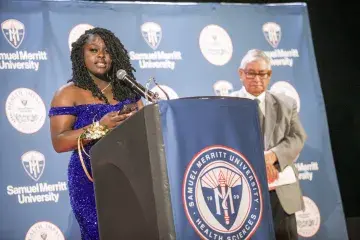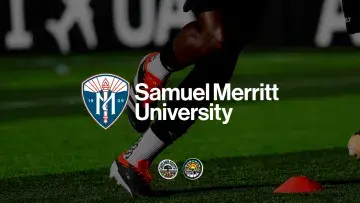Occupational Therapy Professor Wins National Award for Excellence in Healthcare Teamwork
Samuel Merritt University (SMU) Assistant Professor Beth Ching will receive a national award for her work in fostering collaboration among occupational therapists and other healthcare professionals to improve health outcomes for patients.
Ching will be presented the Interprofessional Collaboration Award by the American Occupational Therapy Association (AOTA) at its 2017 Annual Conference and Centennial Celebration in Philadelphia on April 1. The award recognizes an occupational therapist who “demonstrates exemplary interprofessional collaboration in order to provide client-centered care, provide innovation in health professional education, or improve health outcomes through research.”
The award will be inscribed with the motto, “Making space for everyone at the table.”
Ching said she has dedicated herself to building cross-professional knowledge throughout her career to improve the client’s experience. She’s worked mostly with patients who have serious and chronic needs, such as severe mental illness and traumatic brain injury.
“If we can’t all work together, we can’t serve the client as best we can,” she said. “The patient shows a different face to the doctor, a different face to the nurse, a different face to the social worker, and another face to the occupational therapist. We have to put those pieces together to work as a holistic team for the benefit of the patient.”
At SMU, one of Ching’s first assignments was to teach an interprofessional class that brought together occupational therapy and physical therapy students.
At first, the students focused on what made their future professions different and unique, rather than working as part of the same team. The challenges of the course led Ching to focus on improving interprofessional education (IPE) at SMU, one of the nation’s early adopters of IPE curriculum.
“Working in teams with other healthcare professionals is the model of the future,” Ching said. “Our students are going to be prepared for that reality.”
Beginning in 2014 Ching, along with her SMU faculty colleagues, helped create a pilot class for 25 students from all five of the University’s degree programs: nursing, podiatric medicine, physician assistant, physical therapy and occupational therapy.
Over the six-month IPE class, the students gained a better understanding of one another’s professional roles and how to approach healthcare delivery as a team. They studied concepts like “implicit bias” toward patients and discussed the social determinants of health, and how healthcare professionals can work together to identify the causes of their patient’s ailments.
In his nominating letter for Ching, Professor Gordon Giles wrote that Ching exhibits a strong teamwork ethic both in clinical practice and in the classroom.
“Assistant Professor Ching recognizes that an interdisciplinary, non-hierarchal team can provide a seamless continuum of decision-making that results in client-centered care and maximizes patient outcomes…This attitude to client-centered care can begin during professional education but only if this is taught and experienced.”
Student Alondra Ammon said while Ching has strongly influenced how she’ll approach her work as an occupational therapist, Ching’s real impact in her SMU experience has gone beyond textbooks and exam scores.
“One of the most important lessons I learned from Professor Ching was that faculty may serve as more than just educators, but also advocates and mentors,” Ammon said.
Ching said whether she’s working with clients or students, she works hard to make the exchange equally valuable for all parties involved.
“It’s a gift to spend time with people in their most vulnerable moments,” she said of patients. “It’s a two-way exchange. Hopefully, the patient is getting from me skills and experiences and tools to grow; and they’re giving me a gift to be able to share a moment for them that’s both traumatic and transformative.
“I also try really hard to make students feel comfortable because I know what it’s like to be an outsider; I’ve been one myself. So, I don’t take it for granted what anyone’s experience is like walking into a classroom and I try to welcome everyone into the group, no matter where they come from or whatever their background may be.”


